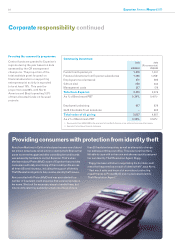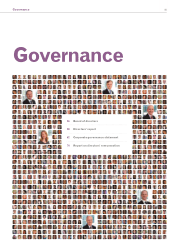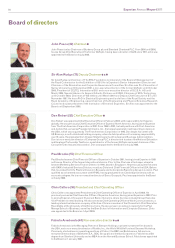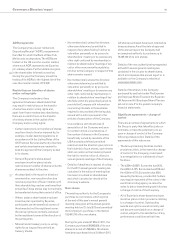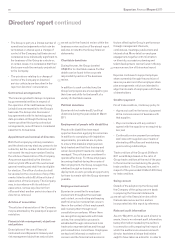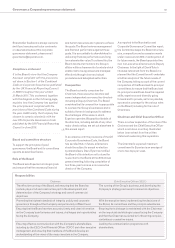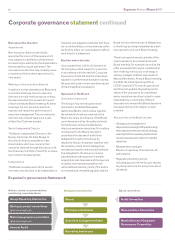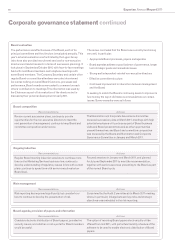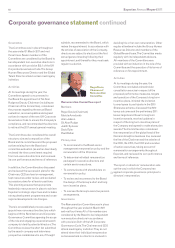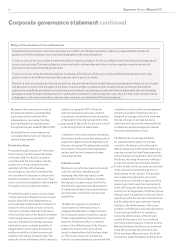Experian 2011 Annual Report Download - page 66
Download and view the complete annual report
Please find page 66 of the 2011 Experian annual report below. You can navigate through the pages in the report by either clicking on the pages listed below, or by using the keyword search tool below to find specific information within the annual report.
64 Experian Annual Report 2011
Corporate governance statement continued
Non-executive directors
Appointment
Non-executive directors are initially
appointed for a term of three years which
may, subject to satisfactory performance
and election/re-election by the shareholders,
be extended by mutual agreement. The
non-executive directors may normally serve
a maximum of three, three-year, terms (i.e.
nine years).
Meetings of non-executive directors
In addition to their attendance at Board and
committee meetings, the non-executive
directors normally meet as a group without
the executive directors present at the end
of each scheduled Board meeting. At these
meetings, the non-executive directors
examine and review the performance of
executive management. The non-executive
directors also meet at least once a year
without the Chairman present.
Senior Independent Director
The Senior Independent Director is the
Deputy Chairman, Sir Alan Rudge. In
this role, Sir Alan is available to meet
shareholders who have concerns that
cannot be resolved through discussion with
the Chairman, the CEO or the CFO, or where
such contact is inappropriate.
Independence
The Board considers each of the current
non-executive directors to be independent in
character and judgement and also that there
are no relationships or circumstances which
are likely to affect (or could appear to affect)
each director’s judgement.
Election and re-election
It is proposed that, in 2011, all directors of
the Company will be subject to re-election
in accordance with the new UK Corporate
Governance Code. All directors have been
subject to a performance evaluation during
the year, and a peer review was done as part
of the annual Board evaluation.
Operation of the Board
Governance framework
The Group’s key internal governance
document is its Global Delegated
Authorities Matrix, which draws together
the schedule of matters reserved to the
Board, the terms of reference of the Board
committees as well as the authority levels
for the Group’s principal subsidiaries,
directors and senior executives. For matters
not reserved to the Board, the matrix
prescribes the cascade of authorities
delegated throughout the Group by
respective Group companies, together with
the monetary limits of such delegations.
Included among the matters that the Board
has delegated to the Group’s principal
subsidiaries are the approval of smaller
acquisitions and disposals and the approval
of capital and revenue expenditure (all
within defined monetary limits). The matrix
is reviewed and refreshed regularly and the
Board monitors the exercise of delegations
to the Group’s principal subsidiaries which
are reported to it at each Board meeting.
There is an agreed annual calendar of the
main business to be considered at each
Board meeting. For example, as well as the
other proposals that may be considered at
each meeting, the focus is on strategy in
January, budgets in March and results in
May and November. At each Board meeting,
the CEO, the Chief Operating Officer
('COO') and the CFO provide operational
and financial updates. Depending on the
nature of the proposal to be considered,
senior executives are often invited to make
presentations or participate in Board
discussions to ensure that Board decisions
are supported by a full analysis of each
proposal.
Key activities of the Board include:
•
Strategy and management
Approval and oversight of Experian’s long-
term objectives and commercial strategy,
ensuring that the necessary financial and
human resources are in place to meet the
objectives.
•
Management oversight
Review of operating, financial and risk
performance.
•
Regulatory/statutory activity
Including approval of the Group’s results,
key documents and the announcement of
dividends.
Advice, review, recommendation,
monitoring, executive forum Delegated authority flow Board committees
Board
Principal subsidiaries
Strategic project committees
(global and regional)
Risk management committees
(global and regional)
Internal Audit
Operating businesses
Audit Committee
Remuneration Committee
Nomination and Corporate
Governance Committee
Experian’s governance framework
Group Operating Committee
Executive management team


